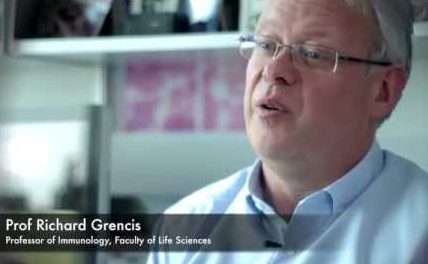 Professor Richard Grencis FRSB,
Professor Richard Grencis FRSB,
Professor of Immunology
Faculty of Biology, Medicine and Health
My research relies heavily on the use of animals and I have worked with the technical staff in the University’s animal facility (BSF) for over 25 years.
The many challenges of working with animals, changing legislation relating to animal work and the progress in biology, genetics and new technologies place varied and often unique demands on the technical staff in the BSF. Despite these, in my experience, one of the key attributes of the technical staff evident in the BSF in Manchester is the “can do” attitude. This is exemplified by one recent development within the BSF, the establishment of the Manchester Gnotobiotic Facility. This is a facility, which requires the provision of animals (mice) completely free from bacteria. It is becoming increasingly apparent that our overall health is influenced considerably by our intestinal microflora, i.e. the bacteria that live in the intestine. The ability to be able to study this in a detailed manner requires studies in “germ free” animals. To establish this within a busy multiuser unit such as ours is an enormous challenge, but the attitude was always that it would be possible, whatever was required.
The support and effort that the technical staff put into this venture was exemplary, requiring imaginative solutions to the many challenges it presented. The success of this facility enabled us to establish one of the first such units in an academic institution in the UK, and has already been used by other leading UK University research groups. Moreover, establishing this capability in Manchester enabled external funding to be applied for and obtained to increase our capabilities in this area of research going forward.
The critical importance of dedicated technical staff to this venture cannot be underestimated; it would not have been possible without them. It is one of many examples where the enthusiasm and the unique expertise of our technical staff has really made a difference to our research and their value cannot be underestimated.
 The next coffee, tea & networking event will be held in the Common Room of the Arthur Lewis Building from 10.30am to 11.30am on Wednesday, May 17th, 2017. The session will not only provide the opportunity for networking with technical colleagues from across the University, but also the first opportunity to sign-up for workplace tours in the following quarter and hear about future tour ideas, as well as other non-TEaM events.
The next coffee, tea & networking event will be held in the Common Room of the Arthur Lewis Building from 10.30am to 11.30am on Wednesday, May 17th, 2017. The session will not only provide the opportunity for networking with technical colleagues from across the University, but also the first opportunity to sign-up for workplace tours in the following quarter and hear about future tour ideas, as well as other non-TEaM events.
 Professor Richard Grencis FRSB,
Professor Richard Grencis FRSB,